Getting the perfect sweet taste in your baked goods without coconut sugar can seem like a quest.
You’re in luck because we’ve got the scoop on the best swaps for coconut sugar.
Ever find yourself halfway through a recipe only to realize you’re out of coconut sugar?
We’ve been there.
That’s why we’re sharing our top five substitutes.
These swaps aren’t just about getting by; they’re about making your baked goods shine.
And the best part?
You probably have most of them in your kitchen right now.
Ready to keep your baking game strong without a coconut sugar grain in sight?
We’ve got the answers.
What is Coconut Sugar?

Coconut sugar is a sweetener made from the sap of coconut palm trees.
Unlike refined sugar, it retains many nutrients found in coconuts, including iron, zinc, calcium, and potassium.
Coconut sugar also has a lower glycemic index than cane sugar, meaning it doesn’t cause spikes in blood sugar levels.
As a result, it is often used as a healthy alternative to refined sugar.
Coconut sugar can be used in recipes, from baked goods to savory dishes.
It can also be added to coffee and tea for a subtle sweetness.
Whether you’re looking for a healthier sweetener or trying something new, coconut sugar is worth checking out.
The 5 Best Substitutes for Coconut Sugar
Coconut sugar has gained popularity as a natural alternative to refined sugar due to its rich flavor and lower glycemic index.
However, if you’re in need of substitutes for coconut sugar or prefer alternative options, there are several alternatives available.
In this guide, we will compare the top 5 substitutes for coconut sugar, discussing their key characteristics and suggesting proper ratios to help you find suitable alternatives.
| Substitute | Key Characteristics | Proper Ratio |
|---|---|---|
| Brown Sugar | Similar flavor profile; moist texture | Use an equal amount of brown sugar as a substitute for coconut sugar |
| Sucanat | Unrefined cane sugar; retains natural molasses | Use an equal amount of sucanat as a substitute for coconut sugar |
| Raw Honey | Natural sweetener with complex flavors; liquid form | Use approximately 3/4 cup of raw honey for every 1 cup of coconut sugar |
| Maple Syrup | Rich, caramel-like flavor; liquid form | Use approximately 3/4 cup of maple syrup for every 1 cup of coconut sugar |
| Agave Syrup | Mild, sweet flavor; liquid form | Use approximately 3/4 cup of agave syrup for every 1 cup of coconut sugar |
Now, let’s dive into each substitute in more detail:
1 – Brown Sugar
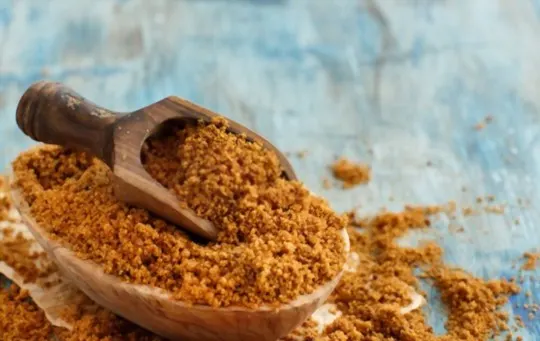
Brown sugar is one of the most popular sweeteners used in baking.
It is made by combining sugar with molasses, a sticky, dark syrup that is a by-product of sugar refining.
The molasses gives brown sugar its distinctively rich flavor and brown color.
Brown sugar is available in two forms: light and dark.
Light brown sugar has a milder and lighter color, while dark brown sugar has a deeper flavor and darker color.
When substituting brown sugar for white sugar in recipes, it is essential to remember that brown sugar is more moister than white sugar.
As a result, it can cause baked goods to become more dense and moist.
For this reason, many bakers prefer to use light brown sugar in their recipes.
- Key Characteristics: Brown sugar has a similar flavor profile to coconut sugar and a moist texture. It contains molasses, which gives it a slightly richer taste.
- Proper Ratio: Use an equal amount of brown sugar as a substitute for coconut sugar. Adjust the quantity based on personal preference and desired sweetness.
2 – Sucanat
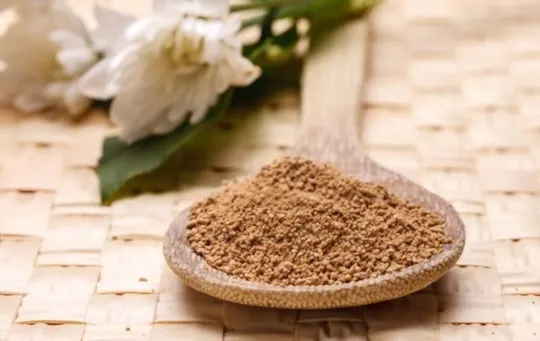
The word ” sucanat” is a portmanteau of the words “sugar” and “cane natural”.
Sucanat is a type of unrefined sugar made from sugar cane juice.
Unlike refined sugar, which is stripped of its molasses content, Sucanat retains much of the molasses.
As a result, it has a deeper flavor and a darker color than refined sugar.
It also contains more vitamins and minerals than its advanced counterpart.
While Sucanat can be used in many of the same ways as refined sugar, its unique flavor makes it ideal for baking or topping for oatmeal or pancakes.
- Key Characteristics: Sucanat is an unrefined cane sugar that retains more natural molasses compared to other sugars. It has a rich flavor profile and can provide a similar depth of flavor as coconut sugar.
- Proper Ratio: Use an equal amount of sucanat as a substitute for coconut sugar. Adjust the quantity based on personal preference and desired sweetness.
3 – Raw Honey
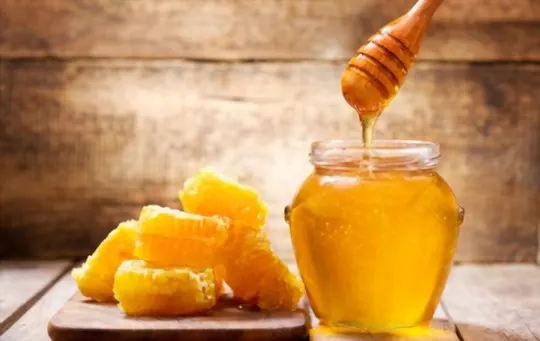
Raw honey is a delicious and nutritional treat that people have enjoyed for centuries.
Unlike processed honey, raw honey has not been heated or filtered, meaning that it retains all of its natural enzymes and pollen.
In addition to being a great source of energy, raw honey is also thought to have some health benefits.
Some studies have shown that raw honey can help to improve digestive problems and boost immunity.
Raw honey is also a natural antibacterial and anti-inflammatory agent, making it an effective treatment for minor cuts and scrapes.
While raw honey is more expensive than processed honey, many people believe it is worth the extra cost.
- Key Characteristics: Raw honey is a natural sweetener with complex flavors. It is available in a liquid form and can add a unique taste to recipes. Honey is sweeter than coconut sugar, so adjust the quantity accordingly.
- Proper Ratio: Use approximately 3/4 cup of raw honey for every 1 cup of coconut sugar. Adjust other liquids and ingredients to maintain the desired consistency in your recipe.
4 – Maple Syrup
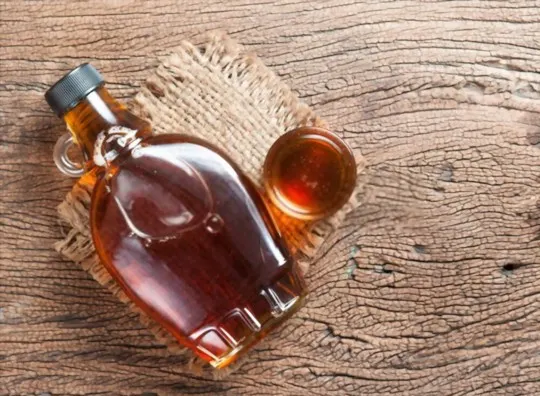
Maple syrup is a delicious, all-natural sweetener that has been enjoyed for centuries.
Made from the sap of maple trees, maple syrup is one of the oldest known sweeteners in North America.
The first recorded use of maple syrup dates back to the indigenous people of what is now Canada, who used it as both a food and medicine.
In the early days of European settlement, maple syrup was an important part of settlers’ diet in eastern Canada and the northern United States.
Today, maple syrup is still produced in these same areas, using traditional methods passed down through generations.
The sap is collected from sugar maples every spring and boiled down to create a rich, flavorful syrup.
Maple syrup can be used in various ways, from pancakes and waffles to baked goods and cocktails.
- Key Characteristics: Maple syrup offers a rich, caramel-like flavor that can be a suitable substitute for coconut sugar. It is available in a liquid form and is commonly used as a sweetener.
- Proper Ratio: Use approximately 3/4 cup of maple syrup for every 1 cup of coconut sugar. Adjust other liquids and ingredients to maintain the desired consistency and sweetness.
5 – Agave Syrup
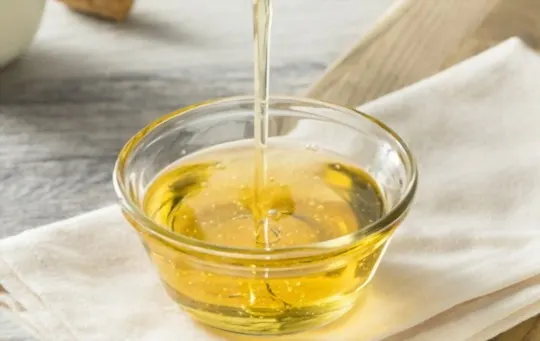
Agave syrup is a delicious and versatile sweetener that can be used in baking to cocktails.
It is made from the sap of the agave plant, which is native to Mexico and Central America.
The sap is high in fructose, which gives it its characteristic sweetness.
Agave syrup has several benefits over other sweeteners, such as being lower on the glycemic index and less impacting blood sugar levels.
It is also vegan and gluten-free.
Whether you are looking for a healthy alternative to sugar or experimenting with a new ingredient, agave syrup is a great option.
- Key Characteristics: Agave syrup has a mild, sweet flavor and is available in a liquid form. It can be used as a substitute for coconut sugar in various recipes, particularly in beverages and baked goods.
- Proper Ratio: Use approximately 3/4 cup of agave syrup for every 1 cup of coconut sugar. Adjust other liquids and ingredients to maintain the desired consistency and sweetness.
Conclusion
In conclusion, coconut sugar is a healthy alternative to refined sugar.
It has a lower glycemic index and contains trace amounts of vitamins and minerals.
However, it is still a sugar and should be consumed in moderation.
If you are looking for a healthier alternative to coconut sugar, consider five substitutes: honey, sucanat, brown sugar, maple syrup, and agave syrup.
Each of these sweeteners has its unique flavor that can add an extra dimension to your baking.
So don’t be afraid to experiment and find the perfect sweetener for your next recipe.
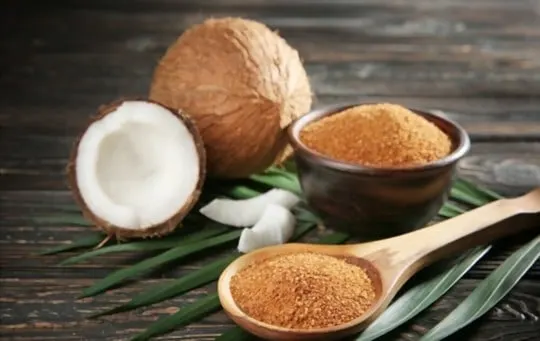
The 5 Best Substitutes for Coconut Sugar
Ingredients
- Brown Sugar
- Sucanat
- Raw Honey
- Maple Syrup
- Agave Syrup
Instructions
- Pick your favorite substitute from the list above.
- Follow cooking directions for your selected substitute with the proper ratio of ingredients.

Andrew Gray is a seasoned food writer and blogger with a wealth of experience in the restaurant and catering industries. With a passion for all things delicious, Andrew has honed his culinary expertise through his work as a personal chef and caterer.
His love for food led him to venture into food writing, where he has contributed to various online publications, sharing his knowledge and insights on the culinary world. As the proud owner of AmericasRestaurant.com, Andrew covers a wide range of topics, including recipes, restaurant reviews, product recommendations, and culinary tips.
Through his website, he aims to inspire and educate fellow food enthusiasts, offering a comprehensive resource for all things food-related.

Leave a comment